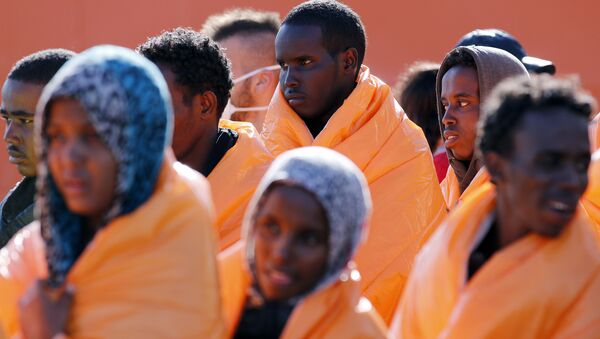The suit, filed in the European Court of Human Rights by 17 Nigerian survivors of a smuggler boat which sunk in the Mediterranean, legally challenges the 2017 deal between Italy and Libya, which sought to provide more effective controls for illegal migration.
According to the memorandum, signed more than a year ago, Italy agreed to equip and train Libyan coastal guards as well as repatriate illegal migrants using the European funds. It has been praised by European leaders and has already helped to establish a sea blockade and better control over the Libyan seaports migrants use on their way to European shores.
This helped to reduce the number of potential refugees in Europe significantly. According to the Italian Interior Ministry, the number of migrants who arrived in the country has dropped by 84 percent from 2017, as nearly 7,000 migrants have reached the Italian shores this year. However, human rights groups debate that due to the new policy, Italy is giving up its international responsibility to provide for the asylum-seekers' safety.
The plaintiffs, who were reportedly tortured in the Libyan detention centers for illegal migrants, are asking the court to state that Italy has violated international law and should pay “moral reparations.” Backed by legal and human rights organizations, they claim in the lawsuit that Italy has violated their rights, “subcontracting” their rescue to Libyan law enforcement.
The potential asylum seekers are said to face torture, slavery and other abuses if they are brought back to Africa. Those backing the case have claimed at a press conference that Rome is responsible for these human rights violations as they coordinate Libyan coast guards through a center in Rome and with an Italian Navy vessel docked off Tripoli, providing for “effective control.” They highlight the severe conditions in Libyan detention centers for migrants, claiming they were well-known and well-documented.
READ MORE: 'This Will Not Be Easy': Italy, Libya to Find It Hard to Stop Migration Flow
The Nigerians who filed the complaint are said to have escaped such centers, where they were sent after a Libyan coast guard vessel saved them from a sinking boat in November 2017. They complain that they were tortured there.
Europe has faced a large influx of migrants, many of them from African countries, with EU member states struggling to accommodate hundreds of thousands of new arrivals. Italy, like Greece, has been one of the major gateways for migrants fleeing to Europe from impoverished African nations and the Middle East. Since 2015, over two million migrants — mainly from Syria, Iraq, Afghanistan, and a number of African countries have entered Europe by sea.
READ MORE: Italy-Libya Migrant Deal 'Makes Good Sense' as EU Secures External Border
Most migrants initially arrived in Italy in poorly maintained smuggler vessels, before crossing through other European countries, to reach more generous EU states, such as Germany and Sweden.
Meanwhile, Libya has been in a state of turmoil since 2011, when longtime leader Muammar Gaddafi was overthrown and a civil war began in the country, as the authorities failed to provide effective border patrol. Only in December 2015, Libya’s rival governments — the Council of Deputies based in Tobruk and the Tripoli-based General National Congress — agreed to create a Government of National Accord (GNA), form a Presidency Council and end the political impasse.


